‘Direct affront to Sikhi,’ says Dhami on Guru Teghbahadar’s Anniversary Event
Panjab: Govt spars with SGPC; Opposition to Land Pooling, Former SP sentenced over extrajudicial killings. Sikh: Guru Teghbahadar anniversary; Sikh woman Kirpan issue; 1984 genocide cases drag in Kanpur; Modi warns Sikhs in UK— and more stories.
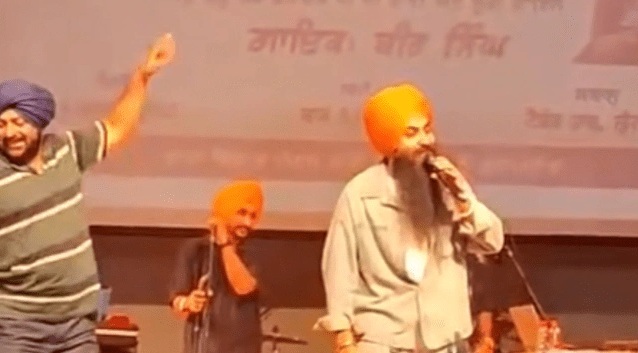
‘Direct affront to Sikhi,’ says Dhami on Guru Teghbahadar’s Anniversary Event
On 24 Jul, the Panjab government marked the 350th martyrdom anniversary of Guru Teghbahadar, the ninth Sikh sovereign, in Srinagar. At the event, instead of solemnity and remembrance of the Guru's sacrifice and martyrdom, the audience was dancing to the tunes of singer Bir Singh. The program was hosted by the Panjab govt’s Language Department in association with Jammu & Kashmir Academy of Art, Culture & Languages. The issue has come up amid ongoing tensions between the Shiromani Gurdwara Parbandhak Committee (SGPC) and the Panjab govt regarding the events related to the martyrdom centenary. On 25 Jul, SGPC president Harjinder Singh Dhami condemned the nature of the program. 'The event held by the Panjab Government’s Language Department goes against the sanctity of the Guru’s supreme sacrifice. It is a direct affront to Sikh religious values and the philosophy of Sri Guru Teghbahadar.' On 26 Jul, Bir Singh offered an apology at Sri Akal Takht Sahib (Eternal Throne, AT). In his Instagram post he mentioned, 'I went directly to the stage, and since all my attention was on the audience, I didn't see the banner behind the stage. This was my mistake.' Though he admits his mistake, he seems to be making an excuse about not seeing the banner. The banner is the same as the invitation card which says the event is to recite verses of Guru Teghbahadar and sing Sufi songs. AT officiating Jathedar (leader) Giani Kuldeep Singh Gargajj has summoned Panjab Cabinet Minister Harjot Singh Bains and Director of the State Language Dept Jaswant Singh on 1 Aug. After the summons were received, Bains issued a public apology saying, 'I’m a humble Sikh, will obey every command.' However, Jaswant Singh has not spoken. The irony is not one person in the management or the audience objected to the song and dance when the program was on.
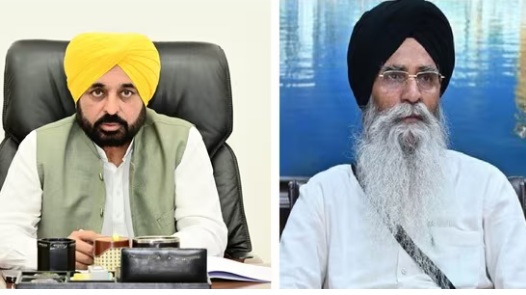
Panjab Govt Spars With SGPC over Guru Teghbahadar Anniversary Events
The Aam Aadmi Party (AAP)-led Panjab government and the Shiromani Gurdwara Parbandhak Committee (SGPC), the apex representative body of Sikhs, are at logger heads over events planned to commemorate the 350th martyrdom anniversary of Guru Teghbahadar from 19-25 Nov. SGPC president Harjinder Singh Dhami said that the Panjab govt should focus on establishing meaningful memorials in connection with the ninth Sikh sovereign instead of creating a confrontational atmosphere by organizing parallel religious events. Dhami said the SGPC has already planned a series of events beginning April 2025 from Gurdwara Guru Ke Mahal, Amritsar. Since then, events have been organized across various parts of the country. He said the Panjab govt’s announcement of parallel events—overlapping with those planned by the SGPC at Anandpur Sahib—will cause confusion among the sangat (community) and goes against long-standing traditions. Panjab Chief Minister Bhagwant Singh Mann retorted: does SGPC have a 'copyright' over observing the upcoming martyrdom day of Guru Teghbahadar? Mann said, 'Whose govt was in power when the 300th anniversary of the Khalsa was celebrated? Wasn't it Parkash Singh Badal's govt? Was it not interference in religious affairs?' Sri Akal Takht Sahib (Eternal Throne, AT) Jathedar (leader) Giani Kuldeep Singh Gargajj backed SGPC president and asked the Panjab CM to become Amritdhari (initiated Sikh) before organizing religious functions which are otherwise the domain of SGPC. He said that Mann and most of his ministers trim their beards, would they adhere to Sikh maryada (code of conduct)? Giani Gargajj also asked all members of Chief Khalsa Diwan to become Amritdhari by 1 Sep. Earlier, on 17 Jul, despite the tensions between India and Pakistan following Operation Sindoor (vermillion marker) the SGPC announced plans to send a jatha (group) of Sikh pilgrims to Pakistan in November to mark Guru Nanak’s birth anniversary. Dhami said the SGPC will approach the Indian govt and hopes they will allow the jatha to Pakistan.
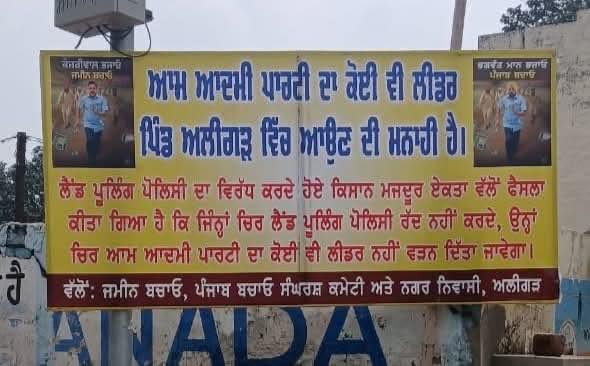
Land Pooling Policy Faces Grave Opposition from Political Parties & Citizens
To bolster its Land Pooling Policy which is facing intense opposition, on 22 July, the Panjab Cabinet approved an amendment offering commercial plots in return for pooled land measuring as little as one kanal (506 sq m or 0.125 acres). Panjab Chief Minister Bhagwant Singh Mann said a landowner offering one kanal of land for pooling would get a residential plot of 125 sq m and a commercial space of 25 sq m in return. The government then promised to issue farmers a Letter of Intent (LoI) within 21 days of getting their consent and announced an annual advance of USD 575 per acre to farmers until development work on the land starts. Indian National Congress (INC) Panjab chief Amrinder Singh Raja Warring said the provision of voluntary contribution was a 'bluff' as the govt was aiming to acquire farmers’ land 'forcibly'. Leader of Opposition, INC’s Partap Singh Bajwa, said AAP’s land pooling policy is an attempt to rob Panjab’s agricultural land. He said, 'The policy is not development, but exploitation disguised as reform, a blatant attempt to dispossess farmers of their most sacred asset.' Shiromani Akali Dal president Sukhbir Singh Badal asked village panchayats (councils) to pass resolutions that they would not give their land to the AAP govt under its land pooling policy. In villages of Panjab, AAP workers are being chased away. Boards have come up disallowing them entry, social media is abuzz with opposition to the policy. On 25 Jul, tension flared in Kot Kalan village near Jalandhar as farmers confronted AAP workers over the controversial land pooling scheme. Villagers seized and burned publicity material, chanting slogans against the state govt and AAP chief Arvind Kejriwal, demanding the scheme's withdrawal. The threat of land pooling has brought farmers unions together. Kisan Mukti Morcha has decided to support Samyukt Kisan Morcha’s call for a tractor march on 30 Jul. The govt which had betrayed farmers leaders and arrested them, evicted Farmers Protest 2.0 (2024-25) on 9 Mar, has now united the farmers (earlier coverage).
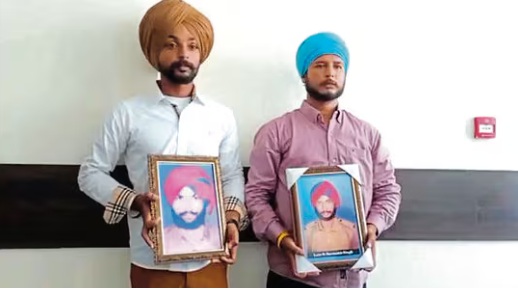
Retired SP Jailed in Police Killed Police Case, Others Acquitted
On 23 Jul, after a 32-year legal battle, a Central Bureau of Investigation (CBI) court in Sahibzada Ajit Singh Nagar sentenced former Station Head Officer (SHO) Beas, retired Superintendent of Police, 68-year-old Paramjit Singh to 10 years of imprisonment and imposed a fine of USD 575 on him for abducting and killing two Panjab Police constables in 1993. The court acquitted Inspector Dharam Singh (then SHO of Lopoke), Assistant Sub-Inspector (ASI) Kashmir Singh, and ASI Darbara Singh due to lack of concrete evidence, while Sub-Inspector (SI) Ram Lubhiya (in charge, Butala police post) died during trial. The case dates back to 18 Apr 1993,when Constable Surmukh Singh (Muchhal village, Baba Bakala) and Constable Sukhwinder Singh (Khiala village, Amritsar), both in their early 20s, were picked up by police and illegally detained. Later, the Majitha police claimed they had killed 'two unidentified militants' in an encounter and cremated their bodies as unclaimed. CBI public prosecutor Anmol Narang said, 'Surmukh Singh was picked up by a team led by then SHO Paramjit Singh, while Sukhwinder Singh was picked by SI Ram Lubhiya.' The next day, Sukhwinder’s parents were denied access to meet him at Beas police station. Four days later, the Majitha police under SHO Dharam Singh falsely claimed an encounter and later filed an 'untraced report'. Acting on the Supreme Court’s orders, the CBI began its probe on 26 Dec 1995 and identified the deceased as the two constables. A formal First Information Report was registered on 28 Feb 1997, and a chargesheet was filed in 1999. Victims’ counsel Sarabjit Singh Verka said, 'Despite charges being framed in 1999, the trial was delayed for over two decades due to baseless petitions. Only 27 witnesses were examined. Others died or turned hostile.' Charanjit Singh, son of late Surmukh Singh said, ‘These police officials not only killed my father but also ruined my life. I had been selected for recruitment in the police, but because of the allegations, I was not issued the appointment letter’ (earlier coverage).
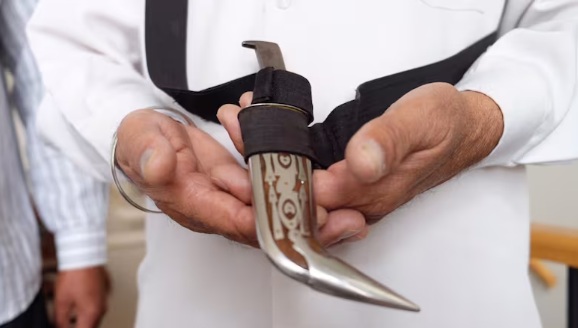
Sikh Woman Barred from Exam Over 'Kirpan'; US & Uzbek Student Win Rights
An Amritdhari (initiated) Sikh woman candidate from Tarn Taran’s Pheloke village was stopped from appearing for the Rajasthan High Court (Jodhpur) Civil Judge recruitment exam in Jaipur because she was wearing a kirpan (traditional sword). After being denied entry, candidate Gurpreet Kaur approached Sri Akal Takht Sahib (Eternal Throne, AT). AT officiating Jathedar (leader) Giani Kuldeep Singh Gargajj condemned the move and directed the Chairman of the National Commission for Minorities, Iqbal Singh Lalpura, to raise the issue with the Prime Minister and Home Minister. Terming the incident a grave violation of the Indian Constitution—Article 25B—and an act of religious discrimination, Jathedar Gargajj questioned the Bharatiya Janata Party-led Rajasthan Government— which claims to protect Sikh interests—on whether it is genuinely safeguarding Sikh rights. He stressed that Amritdhari Sikhs wear the kirpan as a mandatory article of faith, yet they continue to face repeated discrimination due to their distinct identity. He pointed out that similar discrimination had occurred during last year’s recruitment process in Jaipur and Jodhpur. In an earlier such case on 23 Jun involving Lakhwinder Kaur, Lalpura has appealed to Union Law Minister Arjun Ram Meghwal and Rajasthan Governor Haribhau Kisanrao Bagde seeking their urgent intervention in the matter. Meanwhile, a 22-year-old unnamed Sikh medical student has secured a full religious accommodation to wear his kirpan in the US after initially being barred from doing so by university security. The resolution was finalized over the weekend of July 20 by the Sikh Coalition’s legal team, following weeks of advocacy and legal communication. Concurrently, Harshdeep Singh from Talwandi Sabo in Bathinda district, pursuing his medicine degree at Tashkent University’s Medical Academy in Uzbekistan was asked to shave his beard. He maintained his unshorn Sikh appearance and took up the matter with India’s Ministry of External Affairs (MEA). Following MEA’s intervention, Tashkent Medical Academy formally granted Harshdeep permission to attend classes with his beard intact and the discriminatory condition has now been revoked for all Sikh students who will pursue education in the academy (earlier coverage).
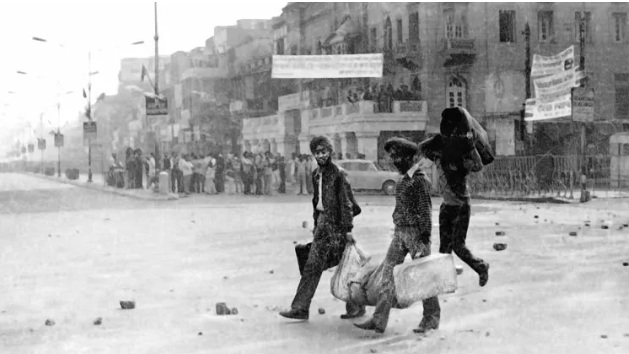
1984 Genocide Cases Drag in UP; Himachal Governor & MP Slander Panjab
On 25 Jul, the Supreme Court on India (SCI) asked the Allahabad High Court to expeditiously decide the appeals in the 1984 Sikh genocide cases. The court order came on a public interest litigation filed by the Delhi Sikh Gurudwara Management Committee that complained about the slow progress of cases in Kanpur, Uttar Pradesh (UP) and sought the court’s intervention to expedite the appeals pending before the High Court seeking re-investigation. The UP government informed the SCI that the Central Forensic Science Laboratory has not been able to decipher the contents of an illegible First Information Report (FIR) registered at Kanpur. The FIR is part of the nine FIRs being investigated by the Special Investigation Team after 35 years. Separately, on 22 Jul, Delhi Minister Manjinder Singh Sirsa moved the Delhi High Court for placing on record former Assistant Commissioner Police Gautam Kaul's report mentioning the presence of former Madhya Pradesh Chief Minister, Indian National Congress’ (INC) Kamal Nath during the violence at Gurudwara Rakab Ganj Sahib on 1 Nov 1984 which claimed the lives of Inderjeet Singh and Manmohan Singh. In a positive development in Varanasi, a dispute over ownership of a 35K sq ft land has been resolved. The land was sealed in the aftermath of the 1984 Sikh genocide. Members from both the Hindu and Sikh communities celebrated by distributing sweets and garlanding each other. Meanwhile, on 25 Jul, raising concerns over rising drug menace in the state, Himachal Pradesh Governor Shiv Pratap Shukla expressed dissatisfaction over lack of govt rehabilitation centers while questioning political will to fight the menace. Shukla warned that if prompt action is not taken, the state could become Udta Punjab—a reference to a 2016 Hindi movie on drug addiction in Panjab. On the same day, while speaking outside Parliament during the ongoing Monsoon Session, the Mandi Member of Parliament Kangana Ranaut said, 'Drugs coming to Himachal Pradesh from Pakistan via Punjab is affecting youth and families in the state.' Both the ruling Aam Aadmi Party and the opposition INC in Panjab have objected to the comments (earlier coverage).
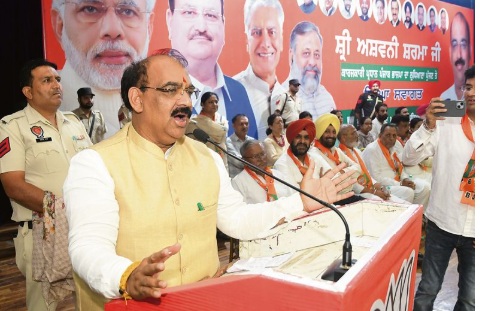
Panjab State President Wants BJP-SAD Alliance, Working President Doesn’t
On 21 Jul, Panjab Bharatiya Janata Party (BJP) president Sunil Jakhar said the party's alliance with the estranged partner Shiromani Akali Dal (SAD) was the need of the hour because forces inimical to the state's interests were resurfacing as these had in 1996 when the alliance was first formalized to meet the imperatives of communal harmony. On the potential for BJP’s expansion in the state, Jakhar said the BJP should aim to win hearts rather than votes in Panjab and must connect with its 'emotional core'. Jakhar was speaking days after Ashwani Sharma, Member of Legislative Assembly from Pathankot, was appointed as state working president signalling an upcoming change of guard. 'Panjab is not merely a geographical area. It is a highly self-respecting society where a pagdi and dastar don't mean just a turban but are synonymous with the sense of sardari—self-esteem—which makes people resist all forms of absolute power. The BJP’s challenge is to grasp the soul of Panjab and assuage the hurt it feels has been historically heaped on it,' said Jakhar when asked why the BJP was struggling in the state. However, on 25 Jul, Sharma said his party would contest the 2027 state Assembly poll alone. Several BJP leaders in Panjab also argue that the experiment with Jakhar has failed because he couldn’t understand the BJP's mindset and the Rashtriya Swayamsevak Sangh’s (BJP's parent organization) value system. 'Whatever Jakhar has conveyed are his personal views,' said a BJP leader from Panjab. BJP old-timers say while handing the state unit reins to Sharma, the party leadership has conveyed there was no scope for any re-alliance with SAD. 'The party will grow organically as well as inorganically on its own merit,' said a BJP leader pointing out that Sikh voters in Delhi voted for a BJP contesting without any alliance with SAD. SAD is adopting a cautious line. Notably, unlike his speech at Damdama Sahib on 13 Apr in which he blamed BJP, this time at Chabal on 20 Jul, SAD president Sukbir Singh Badal did not mention BJP at all (earlier coverage).
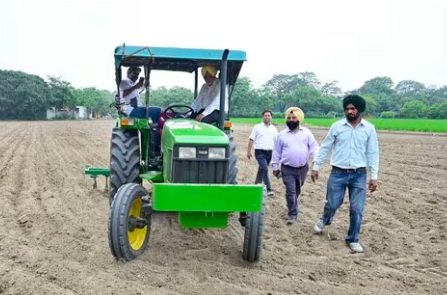
New Seeds Law; PAU Among Top 100 Universities, Develops Driver-less Tractor
The Panjab Cabinet approved the Seeds (Punjab Amendment) Bill, 2025, to make the sale of spurious seeds a non-bailable offence. A spokesperson for the Chief Minister’s Office said there had been no amendment to Section 19 of the Seeds Act, 1966, since its inception, due to which the fine and penalties had no deterrence. So the Cabinet gave the nod to amend the Act and insert Section 19A for the contravention of Section 7, enhancing the fine and penalty for spurious seeds, besides making it a cognizable and non-bailable offence. In other news, Punjab Agricultural University (PAU), Ludhiana, has secured the 93rd rank in Agricultural Sciences in the EduRank 2025 list of the world’s top 100 agricultural institutions. Among 4,407 institutions worldwide assessed in this category, PAU is the only state agricultural university from India to feature on the list. On 21 Jul, PAU demonstrated its Global Navigation Satellite System (GNSS)-based auto-steering system for tractors with a live demonstration at its research farm. The tractor, with a cultivator attached, moved through the farm creating furrows, navigating turns and bends with ease. In a statement, PAU said, 'With manual steering, field implements like disc harrow, cultivator, and rotavator showed overlaps between 3-12%. With the auto-steering system, these overlaps dropped to about 1%. Missed areas reduced from 2-7% to under 1%.' Meanwhile, a quiet Blue Revolution is taking place in Panjab. Since 2020-21, Panjab’s fish production has increased by over 35K tonnes, worth USD 57M, while the total production amounts to over 200K tonnes, worth USD 345M. In 2024, Sukhjeet Kaur, a farmer from Ransih Kalan village in Moga district, began fish farming in 4.5 acres of pond. In her very first season, she sold fish worth nearly USD 8K. The Guru Nanak Cooperative Society, comprising 11 members, has developed fish ponds over 20 acres in Faridkot’s Machaki Mal Singh village—an area known for waterlogging. 'We started this initiative in a region where agriculture was becoming unviable. Fish farming has turned that challenge into an opportunity,' said Mandeep Singh, secretary of the society (earlier coverage).
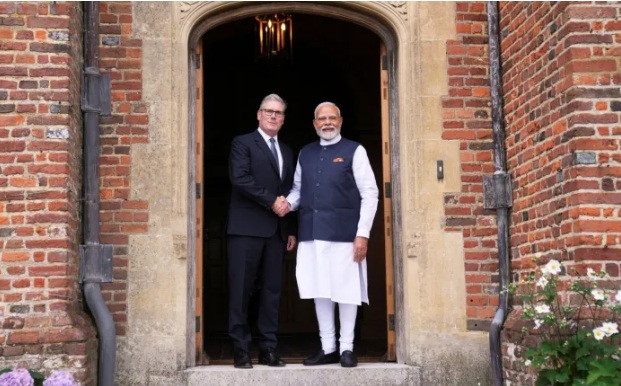
India & UK Sign FTA; Modi Warns Sikhs Separatists
UK and India signed a Free Trade Agreement on 24 Jul during a visit by Indian Prime Minister Narendra Modi. Both countries have decided to cut tariffs on goods from textiles to whisky and cars and allow more market access for businesses. Talks on the trade agreement were concluded in May after three years of stop-start negotiations, with both sides hastening efforts to clinch a deal in the shadow of tariff turmoil unleashed by US President Donald Trump. The agreement aims to increase bilateral trade by a further GBP 25.5B (USD 34B) by 2040. This is the UK's biggest trade deal since it left the European Union in 2020. It is India's biggest strategic partnership with an advanced economy, and it could provide a template for a long-mooted deal with the EU and for talks with other regions. Both sides hailed the deal—which will take effect following a ratification process, likely within a year—as historic. Modi called the agreement 'a blueprint for our shared prosperity,' highlighting how Indian goods from textiles to jewelry and seafood would secure better market access. Before Modi left for the UK, on 22 Jul, Indian Foreign Secretary Vikram Misri warned that Sikh separatists are a 'matter of concern' for countries like the UK, as the space given to them 'impacts social cohesion and social order' in these countries. In March, India had issued a stern warning to London, demanding 'action' not 'words' after Sikh separatists broke a security cordon and tore an Indian flag in front of External Affairs Minister Subramanium Jaishankar’s vehicle as he was exiting an event in the country. In the end of 2023, Vikram Doraiswami, India’s High Commissioner to the UK was prevented from entering a Gurdwara in the city of Glasgow by protesters linked to the Sikh separatist movement. In his joint address with his British counterpart Keir Starmer, Modi said, 'We also agree that forces with extremist ideologies must not be allowed to misuse democratic freedoms. Those who misuse democratic freedoms to undermine democracy itself must be held to account’ (earlier coverage).
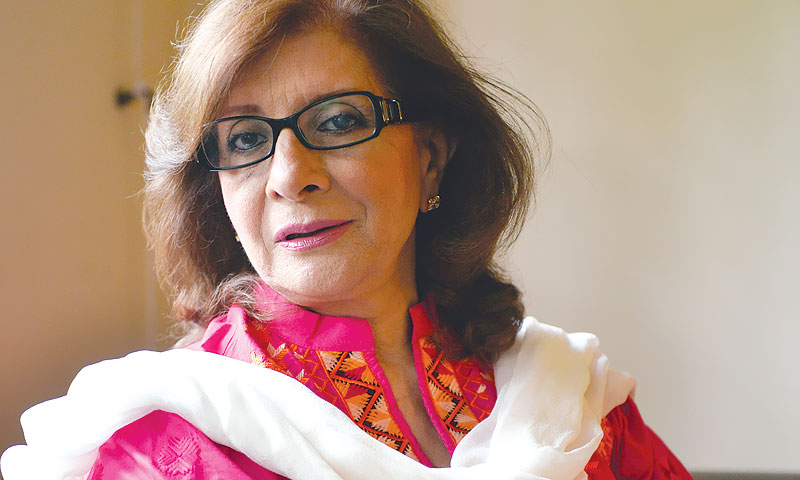
Pakistani TV Veteran with Cross-border Appeal
For years, political hostilities between India and Pakistan have disrupted entertainment exchange, but rarely have restrictions been as sweeping as those triggered by the Pahalgam attack fallout, in April 2025. The latest wave of bans targeted Pakistani shows on YouTube, blocked streaming access to cross-border dramas on Netflix and Amazon Prime, and even temporarily disabled Instagram accounts of Pakistani actors and peace activists. The clampdown came at a time when Pakistani dramas have been enjoying immense popularity across the border in Panjab up to Delhi, on YouTube and on Facebook. They have not just built massive fan bases there but are also engaging with radical themes. A standout example is Tan Man Neelo Neel (Body and Mind Covered in Bruises)—a three-part mini series that aired August 2024 on the privately owned Hum TV, produced by veteran television pioneer Sultana Siddiqui. Each installment tells a stand-alone story. Each is bound by the shared theme of how far-right radicals terrorize individuals and the communities they inhabit at large and the limitations of the state to give justice or security to the victims. Since she launched Hum TV in 2005, Sultana Siddiqui, now in her late 70s, has used television as a platform for storytelling from a progressive bent of mind, offering a nuanced portrayal of Pakistani society through deeply grounded characters. Zindagi Gulzar Hai (Life is Beautiful) in 2012 was a hit in India. The series shows a picture of Pakistan different from the narrative seen in the Indian context. Its popularity, fuelled by social media, created a demand for Pakistani content in the Indian market. Its lead actor Fawad Khan went on to become a Bollywood heartthrob but was banned in India along with other Pakistani artists following the 2016 Uri attack. The Pakistani film Maula Jatt has been stalled. The series are part of a long line of Hum TV productions that have challenged social norms, like Udaari (Soaring, on child sexual abuse) and Dar Si Jaati Hai Silah (Silah Gets a Bit Scared, on domestic violence).
Notes
Suggested Reading
Samata Biswas, The Scroll: The world’s largest democracy is on the path to creating South Asia’s new stateless population.
Like what you're reading? Subscribe to our top stories.
Liv Forum provides a digest of analysis on major issues facing Indian (East) Panjab and Sikhs globally.
In accordance with our Privacy Policy, we will never share or sell the information of our subscribers.
PM Modi Visits Dera Sachkhand Ballan; BJP Wins Chandigarh Mayoral Elections
Panjab: PM Modi Visits Dera Sahkhand Ballan; BJP Wins Chandigarh Mayoral Elections; Trump Announced US Tariffs To Be Lowered; India-EU Sign FTA; CM Mann Invokes Bhai Kanhaiya in SYL Talks with Haryana. Sikh: Police Picks Up Two from Darbar Sahib; Panjab-based Sikh Organizations Commemorate 1986 Sarbat Khalsa—and more stories.
Delhi Court Acquits Sajjan Kumar in 4th 1984 Sikh Genocide Case
Panjab: Rally by independent journalists; Operation Prahar against gangsters & associates. Sikhs: Sajjan Kumar acquitted in 4th Sikh Genocide case; US Bill to prevent discrimination against Sikhs; UK report flags rising anti-Sikh sentiment—and more stories.


